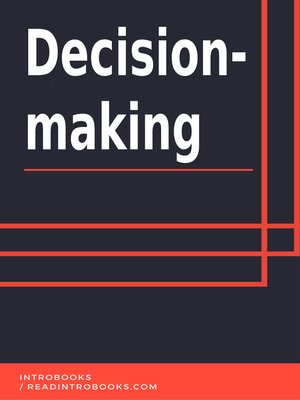
Sign up to save your library
With an OverDrive account, you can save your favorite libraries for at-a-glance information about availability. Find out more about OverDrive accounts.
Find this title in Libby, the library reading app by OverDrive.



Search for a digital library with this title
Title found at these libraries:
| Loading... |
Decision making can be considered as an acivtity of solving a problem through a solution which is the best. The process may or may not be rational and can be grounded on knowledge and thinking.
For instance, someone may have a secured job, decent savings and an enjoyable life but when the same person wants to quit the job, use all the savings and take an additional loan to start a business then the decision taken will impact the future of the person and those connected to that person. The impact can be either positive or negative. If the business takes off then the person will never regret having taken the decision but if the business fails the person is going to regret. The decision made by the person to begin or not to begin the business may have taken several days because of the various facts that might have been taken into consideration.
The main part of decision making comprises of analysing certain number of alternatives defined in terms of evaluative conditions. The next step involves to rank these alternatives on how good they can be to the decision maker once all the conditions are measured at the same time. Another part in the process of decision making could be to identify the best alternative or to find out the priority of each alternative especially in financial cases, when all the alternatives are taken in consideration consurrently. Solving such problems is the main objective of multiple criteria decision analysis or MCDA. Researchers and experts who have studies this section of decision making continue to debate its exactness because the results are different despite the fact that the data is same. This is because the MCDA methods are different.






